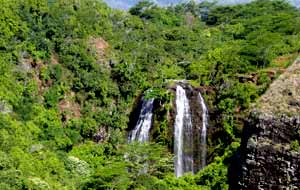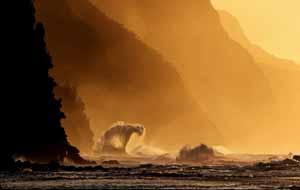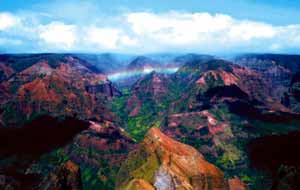Gay Kaua’i Resource Directory
Discover Gay Friendly Kaua’i
Kaua’i is the fourth largest of the inhabited Hawaiian islands, as well as being the oldest and the northernmost. A lush island of jagged cliffs, cascading waterfalls, and emerald tropical forests, some parts of the island’s interior can only be reached by air. It is also the only Hawaiian island with navigable rivers. Kaua’i is divided into five regions – Lihue, East Side, North Shore, South Shore, and West Side.
Lihue, in the southeast of the island, is center of government and commerce, site of both Lihue Airport and Nawiliwili Harbor, the major air and sea hubs of Kaua’i. Lihue also boasts excellent beaches, scenic waterfalls, and a great deal of local history. Among the sites to see are Wailua Falls, north of Lihue proper, which some may recognize from the opening credits of “Fantasy Island;” Kilohana Estate, a huge Tudor-style mansion that was once the heart of a vast sugar plantation and is now the site of one-of-a-kind shops; the Grove Farm Homestead Museum, where one may learn about the history of the Hawaiian sugar industry while touring the gardens; the Kauai Museum, featuring both local artwork and history; and the Huleia Nation Wildlife Refuge, where sits Alekoko Menehune Fishpond, an artificial pond built by native Hawaiians to trap fish nearly 1,000 years ago – though local legend claims it was built by the mysterious Menehune, a mischievous little people of the forest.
The East Side of Kaua’i (north of Lihue) is sometimes known as the Royal Coconut Coast, because of the groves of coconut palms which grace her beachside resorts. It is the most populous region of Kaua’i. The town of Kapa’a, north of the Wailua River, offers shopping and dining, as well as water skiing and kayaking. Between Kapa’a and Lihue, just south of Wailua, is Lydgate State Park, where you’ll find one of Kauai’s gay-friendly beaches. Another is Donkey Beach, north of Kapa’a, known as both a gay and a nudist beach. And not far from Donkey Beach is Anahola Beach, where you can find Mahina Kai Ocean Villa, a gorgeous, Japanese-style establishment catering to the LGBT community. You can also take a boat ride up Wailua River, where you might visit such magical places as Opaeka’a Falls, the famed Nounou Mountain (the Sleeping Giant), or the amazing Fern Grotto, a popular (if out of the way) wedding destination once reserved for Hawaiian royalty.
The North Shore area is a region of extraordinary beauty, perhaps best known for the towering cliffs of Napali Coast. Heading west from along the north coast of the island, you’ll reach Kilauea, where the famous Kilauea Lighthouse stands aloft overlooking the sea. Not far from here is also where you’ll find Kauapea Beach, the third of Kauai’s gay beaches and a spectacularly beautiful spot in itself. Further along you’ll come to the high-end resort town of Princeville, and then Hanalei Town, where you’ll find art galleries, shopping and dining, as well as the historic Waioli Mission House. This is also the place to come for ukulele concerts, held at the Hanalei Community Center. Beyond Hanalei are the breathtaking, 3,000-foot cliffs of the aforementioned Napali Coast. There is no automobile access to these cliffs; you’ll either have to rough it with a long and arduous hike, or take an air or boat tour.
South Shore, to the south and west of Lihue, is known for beautiful Poipu Beach Park. In addition to natural beauty and relatively calm waters, Poipu is frequented by a wide variety of marine life, including humpback whales, green sea turtles, and endangered Hawaiian monk seals. Nearby are shops, restaurants, resorts, and golf courses. Old Koloa town, nearby, features picturesque buildings from the sugar plantation days. Learn about the role of the sugar industry in Hawaii’s development on the ‘Ka Ala Hele Waiwai Ho’olina o Koloa’, or Koloa Heritage Trail, a self-guided tour featuring 14 historic sites.
The West Side of Kaua’i includes attractions of both historical interest and immense natural beauty. Hanapepe Town, west of Koloa, is known as a center of the art scene in Kaua’i and has more art galleries than any other community on the island. The plantation-era architecture has been little changed over the last century, giving this small town a quiet charm – Hanapepe was the inspiration for the hometown of the main characters in the Disney animated film, Lilo & Stitch. Check out the ‘Hanapepe Swinging Bridge’ as well as the galleries, shops, and restaurants, especially during Friday evening’s Art Night. Farther west along the coast is Waimea Town, which is near where the famed explorer, Captain James Cook, first landed on the Hawaiian islands. A statue of Cook, modeled on an original from Whitby, England, stands in the center of town. Also of interest is the West Kaua’i Technology & Visitor Center, where you can learn much about the island’s history. Inland, north of Waimea, is the gorgeous Waimea Canyon, known as the ‘Grand Canyon of the Pacific.’ Though not as large or as ancient as Arizona’s Grand Canyon, Waimea Canyon presents 14 miles of extraordinary vistas unlike anything else in Hawai’i. Beyond the canyon lies beautiful Kokee State Park, a realm of lofty cliffs adorned with the emerald splendors of native forests. Visitors, especially those who plan on going on a long hike through this verdant area, should check out the Kokee Natural History Museum. Kokee Park opens out into the majestic sea cliffs of Napali Coast, in Kauai’s North Shore.
There’s plenty to see and do on the Garden Isle of gay Kauai and we’ve assembled the best of the best in gay tourism and travel to help you plan your next vacation or LGBT wedding!











